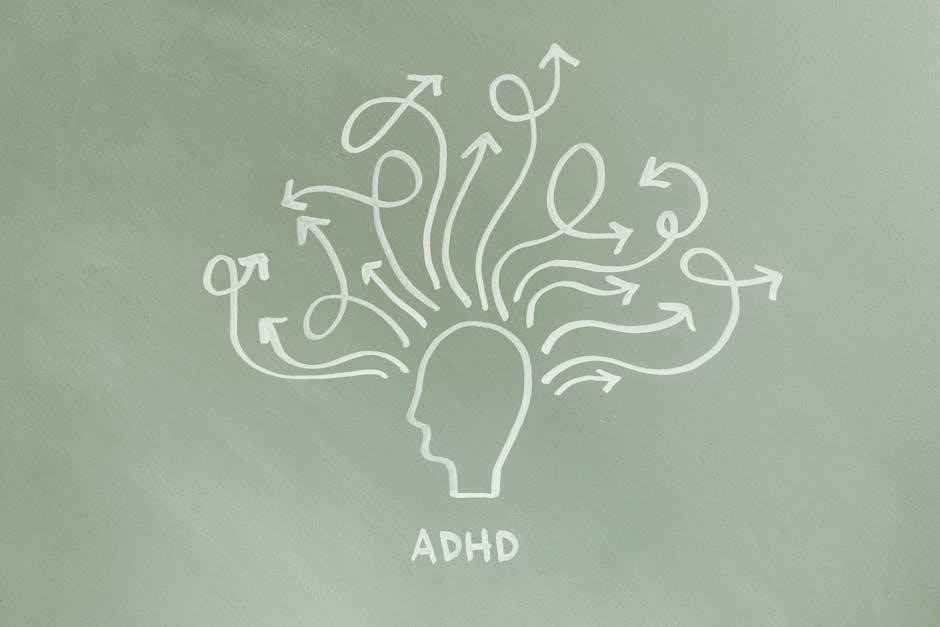Dialectical Behavior Therapy (DBT) is a powerful‚ evidence-based approach developed by Marsha Linehan to treat emotional dysregulation. It combines mindfulness with practical coping skills to manage intense emotions‚ improve relationships‚ and reduce self-destructive behaviors. Originally designed for borderline personality disorder‚ DBT is now widely used for various mental health challenges‚ including depression‚ anxiety‚ and substance use disorders. The therapy emphasizes acceptance and change‚ teaching individuals to navigate life’s challenges with greater resilience and balance.
1.1 What is DBT?
Dialectical Behavior Therapy (DBT) is an evidence-based psychotherapy developed by Marsha Linehan. It focuses on teaching individuals skills to manage emotional dysregulation‚ improve relationships‚ and reduce harmful behaviors. DBT blends acceptance strategies with behavioral change techniques‚ emphasizing mindfulness and practical coping tools for long-term emotional well-being and resilience.
1.2 Key Principles of DBT
Dialectical Behavior Therapy (DBT) focuses on emotional regulation‚ distress tolerance‚ and interpersonal effectiveness. It emphasizes mindfulness‚ acceptance‚ and behavioral change‚ helping individuals manage intense emotions and reduce harmful behaviors. The therapy integrates four core skill modules to foster resilience and improve overall well-being.
Overview of the Dialectical Behavior Therapy Skills Workbook
The workbook offers practical‚ evidence-based exercises to master DBT skills like mindfulness‚ emotion regulation‚ and distress tolerance. It provides a structured approach to applying these techniques effectively in daily life.
2.1 Authors and Publication Details
The workbook is authored by Matthew McKay‚ PhD‚ Jeffrey C. Wood‚ PsyD‚ and Jeffrey Brantley‚ MD. Published by New Harbinger Publications in 2019‚ it is part of the New Harbinger Self-Help Workbook series‚ offering evidence-based strategies for mastering DBT skills effectively.
2.2 Structure and Key Features
The workbook is structured into modules covering mindfulness‚ interpersonal effectiveness‚ emotion regulation‚ and distress tolerance. It includes step-by-step exercises‚ practical examples‚ and worksheets to help users master DBT skills. The evidence-based approach focuses on real-life applications‚ making it accessible and effective for personal growth and therapy settings.
Dialectical Behavior Therapy (DBT) is an evidence-based approach by Marsha Linehan‚ combining mindfulness and practical skills to manage emotions and behaviors. It’s widely used for various mental health challenges‚ focusing on acceptance and change to enhance resilience and emotional balance.
Dialectical Behavior Therapy (DBT) is an evidence-based psychotherapy developed by Marsha Linehan. It combines cognitive-behavioral techniques with mindfulness practices to help individuals manage emotional dysregulation‚ reduce harmful behaviors‚ and improve relationships. The workbook provides practical exercises to master these skills and achieve emotional balance.
1.2 History and Development
Developed by Marsha Linehan in the 1980s‚ DBT emerged as a response to the limitations of traditional therapies for borderline personality disorder. Integrating cognitive-behavioral techniques with mindfulness‚ DBT focuses on emotional dysregulation and self-destructive behaviors‚ offering a structured approach to foster resilience and self-awareness;

Overview of the Workbook
The Dialectical Behavior Therapy Skills Workbook offers practical‚ evidence-based exercises to master mindfulness‚ interpersonal effectiveness‚ emotion regulation‚ and distress tolerance‚ providing tools for lasting emotional and behavioral change.
2.1 Authors and Publication
The workbook is authored by Matthew McKay‚ PhD‚ Jeffrey C. Wood‚ PsyD‚ and Jeffrey Brantley‚ MD. Published by New Harbinger Publications in 2019‚ it is part of their respected self-help series‚ offering evidence-based DBT exercises for personal growth and emotional well-being.
2.2 Structure and Features
The workbook is organized into sections focusing on mindfulness‚ interpersonal effectiveness‚ emotion regulation‚ and distress tolerance. It includes step-by-step exercises‚ practical tools‚ and real-life applications‚ making DBT accessible and actionable for individuals seeking to manage emotions and improve relationships effectively.
Mindfulness Skills
Mindfulness skills in the workbook teach users to observe emotions without judgment‚ focusing on the present moment. Exercises like “wise mind” and “urges surfing” help reduce emotional reactivity and increase self-awareness‚ promoting a balanced and non-judgmental approach to life’s challenges.

Interpersonal Effectiveness
Interpersonal effectiveness skills empower users to communicate assertively‚ set boundaries‚ and maintain healthy relationships. The workbook provides exercises to enhance assertiveness‚ active listening‚ and self-respect‚ helping individuals express needs clearly while preserving connections and avoiding conflict.
Emotion Regulation
Emotion regulation skills help individuals manage intense feelings by identifying and understanding emotions‚ reducing vulnerability‚ and increasing positive experiences. The workbook offers practical exercises to modulate emotional responses‚ promoting stability and resilience in daily life through targeted strategies.
Distress Tolerance
Distress tolerance teaches coping strategies for managing crises without worsening emotions. Techniques like deep breathing‚ radical acceptance‚ and distraction help individuals survive difficult moments. The workbook provides exercises to enhance resilience‚ allowing users to navigate distress effectively while working toward long-term solutions.

Using the Workbook
The workbook guides users through practical DBT exercises‚ starting with foundational skills and progressing to advanced techniques. It encourages consistent practice‚ reflection‚ and application of strategies in daily life to foster lasting behavioral change and emotional well-being.

Relevance to Mental Health Issues
The workbook is highly relevant for individuals struggling with emotional dysregulation‚ borderline personality disorder‚ depression‚ anxiety‚ PTSD‚ and substance abuse. Its practical exercises target these issues by teaching mindfulness‚ distress tolerance‚ and emotion regulation‚ offering a structured path to managing symptoms and improving mental health outcomes effectively.
Popularity and Accessibility
The workbook’s popularity stems from its accessible‚ evidence-based approach‚ offering practical exercises for managing emotions and behaviors. Available in multiple formats‚ including PDF‚ it caters to diverse learning preferences‚ making DBT skills widely reachable for both self-help and therapeutic settings.
Key Exercises
The workbook includes essential exercises like dialectical thinking‚ self-acceptance‚ and mindfulness practices. These activities help users master DBT skills‚ such as emotional regulation and distress tolerance‚ through structured‚ evidence-based tasks designed for practical application and lasting behavioral change.
The workbook offers a comprehensive guide to mastering DBT skills‚ empowering individuals to manage emotions‚ improve relationships‚ and cope with distress effectively. Its practical exercises and clear structure make it an invaluable resource for lasting mental health improvement and personal growth.
Dialectical Behavior Therapy (DBT) is a transformative approach developed by Marsha Linehan to address emotional dysregulation and maladaptive behaviors. The workbook provides practical exercises to master mindfulness‚ interpersonal effectiveness‚ emotion regulation‚ and distress tolerance‚ offering tools for lasting change and emotional well-being.
Dialectical Behavior Therapy (DBT) is an evidence-based approach developed by Marsha Linehan to address emotional dysregulation and maladaptive behaviors. It focuses on four core skills: mindfulness‚ interpersonal effectiveness‚ emotion regulation‚ and distress tolerance. The workbook provides practical exercises to help individuals manage emotions and behaviors effectively.
1.2 Key Principles
DBT emphasizes balance between acceptance and change‚ focusing on four core skills: mindfulness‚ interpersonal effectiveness‚ emotion regulation‚ and distress tolerance. These principles guide individuals to manage emotions‚ improve relationships‚ and develop coping strategies for life’s challenges‚ as outlined in the workbook.
The workbook provides practical exercises for mastering DBT skills like mindfulness and emotion regulation. Authored by experts‚ it offers evidence-based strategies for real‚ lasting change.
The workbook is authored by Matthew McKay‚ PhD‚ Jeffrey C. Wood‚ PsyD‚ and Jeffrey Brantley‚ MD. Published by New Harbinger Publications‚ it offers evidence-based exercises for mastering DBT skills like mindfulness‚ emotion regulation‚ and distress tolerance‚ providing practical tools for lasting change since its release.
Organized into clear modules‚ the workbook focuses on four core DBT skills: mindfulness‚ interpersonal effectiveness‚ emotion regulation‚ and distress tolerance. Each section includes practical exercises‚ step-by-step guides‚ and real-life examples to help users apply these skills effectively in daily life‚ promoting lasting behavioral and emotional change.
Mindfulness Skills in the Workbook
The workbook teaches mindfulness techniques to help individuals stay present and manage emotions effectively. Through exercises like observation without judgment and mindful breathing‚ users learn to cultivate awareness and reduce emotional reactivity‚ fostering a balanced and grounded approach to life’s challenges.

Interpersonal Effectiveness Techniques
The workbook provides practical exercises to enhance interpersonal effectiveness‚ teaching assertiveness and boundary-setting skills. Users learn to communicate needs clearly while maintaining relationships‚ balancing self-respect with empathy for others‚ and navigating conflicts constructively‚ fostering healthier and more fulfilling interactions in personal and professional life.

Emotion Regulation Strategies
The workbook offers tools to manage emotions effectively‚ teaching users to identify triggers‚ reduce emotional vulnerability‚ and employ techniques like cognitive restructuring and opposite action; These strategies help individuals regulate emotional intensity‚ leading to more balanced and adaptive responses to challenging situations in daily life.
Distress Tolerance Skills
Distress tolerance skills teach individuals to cope with crises without worsening the situation. Techniques like deep breathing‚ progressive muscle relaxation‚ and mindfulness help manage intense emotions. The workbook provides exercises to practice these skills‚ enabling users to stay calm and think clearly during stressful or overwhelming situations‚ fostering resilience and emotional stability.
How to Use the Workbook Effectively
Start with introductory exercises to build a foundation in DBT concepts. Progress through each module‚ practicing skills like mindfulness and emotional regulation. Regular practice and applying skills to real-life situations enhance effectiveness. Consider working with a therapist for guidance and tracking progress to ensure consistent improvement and lasting change.
Relevance to Specific Mental Health Issues
The workbook is highly relevant for addressing anxiety‚ depression‚ borderline personality disorder‚ and PTSD. Its exercises help manage emotional dysregulation‚ reduce stress‚ and improve coping strategies‚ making it a valuable resource for individuals seeking practical tools to enhance mental health and well-being effectively.
Popularity and Accessibility of the Workbook
The workbook is widely popular due to its practical‚ evidence-based approach‚ making DBT accessible to everyone. Available in PDF and paperback‚ it is a bestseller‚ praised for its clarity and effectiveness. Its user-friendly design and comprehensive exercises have made it a go-to resource for both professionals and individuals seeking self-help tools.
Key Exercises and Practical Applications
The workbook offers step-by-step exercises like self-acceptance practices‚ mindfulness drills‚ and crisis survival strategies. These tools help users apply DBT skills in real-life situations‚ fostering emotional resilience and improving interpersonal relationships. Practical applications include worksheets for tracking progress and managing distress effectively.
The workbook provides comprehensive tools for mastering DBT skills‚ offering lasting benefits like improved emotional resilience and interpersonal effectiveness. Its practical exercises and clear guidance make it an invaluable resource for both personal growth and professional therapy‚ helping users achieve meaningful‚ long-term change in their lives.
Dialectical Behavior Therapy (DBT) is a evidence-based psychotherapy developed by Marsha Linehan‚ focusing on mindfulness and emotional regulation. It helps individuals manage intense emotions and improve relationships‚ offering practical tools for long-term mental well-being and personal growth.
What is DBT?
Dialectical Behavior Therapy (DBT) is a psychotherapy approach developed by Marsha Linehan‚ blending cognitive-behavioral techniques with mindfulness. It helps individuals manage emotions‚ reduce self-destructive behaviors‚ and improve relationships. Originally designed for borderline personality disorder‚ DBT is now widely used for various mental health issues. The workbook provides practical exercises for applying DBT skills.
Key Principles
DBT focuses on balancing acceptance and change‚ emphasizing mindfulness‚ distress tolerance‚ emotion regulation‚ and interpersonal effectiveness; These principles guide individuals to manage emotions‚ reduce harmful behaviors‚ and improve relationships. The workbook offers structured exercises to master these skills for real and lasting personal growth.
The workbook‚ authored by McKay‚ Wood‚ and Brantley‚ offers evidence-based‚ step-by-step exercises to master DBT skills like mindfulness‚ interpersonal effectiveness‚ emotion regulation‚ and distress tolerance for real change.
Authors and Publication
Matthew McKay‚ PhD‚ Jeffrey C. Wood‚ PsyD‚ and Jeffrey Brantley‚ MD authored this workbook. It was published by New Harbinger Publications in 2019 as the first edition‚ offering evidence-based DBT exercises for practical skill development and emotional well-being.
Structure and Features
The workbook is structured into clear sections for mindfulness‚ interpersonal effectiveness‚ emotion regulation‚ and distress tolerance. It offers step-by-step exercises‚ practical applications‚ and downloadable PDF resources. Designed for accessibility‚ it provides evidence-based techniques in a user-friendly format‚ making DBT skills attainable for self-help and therapeutic use.
Mindfulness in DBT focuses on cultivating present-moment awareness without judgment. The workbook offers exercises like observing thoughts and emotions non-judgmentally‚ practicing “wise mind‚” and engaging in mindful breathing. These techniques help reduce emotional reactivity‚ enhance self-awareness‚ and promote a balanced‚ non-judgmental approach to daily challenges and emotions.
Interpersonal effectiveness in DBT focuses on improving communication and relationship skills. The workbook provides exercises to enhance assertiveness‚ set boundaries‚ and express needs while maintaining respect and emotional well-being. These skills help individuals navigate conflicts and build stronger‚ more fulfilling relationships in personal and professional settings.
Emotion regulation in DBT helps individuals manage intense emotions and reduce emotional vulnerability. The workbook offers exercises to identify‚ understand‚ and regulate emotions. Strategies include challenging negative thoughts‚ practicing self-soothing techniques‚ and increasing positive experiences to enhance emotional resilience and well-being.
Distress tolerance teaches individuals to cope with crises without worsening the situation. The workbook provides techniques like the STOP skill and self-soothing methods to manage emotional overwhelm. These strategies help survive difficult moments‚ allowing time to apply more effective problem-solving skills later.
The Dialectical Behavior Therapy Skills Workbook is a transformative resource for managing emotions and improving mental health. By offering practical exercises‚ it empowers individuals to cultivate resilience‚ balance‚ and effective coping strategies‚ leading to lasting personal growth and emotional well-being.